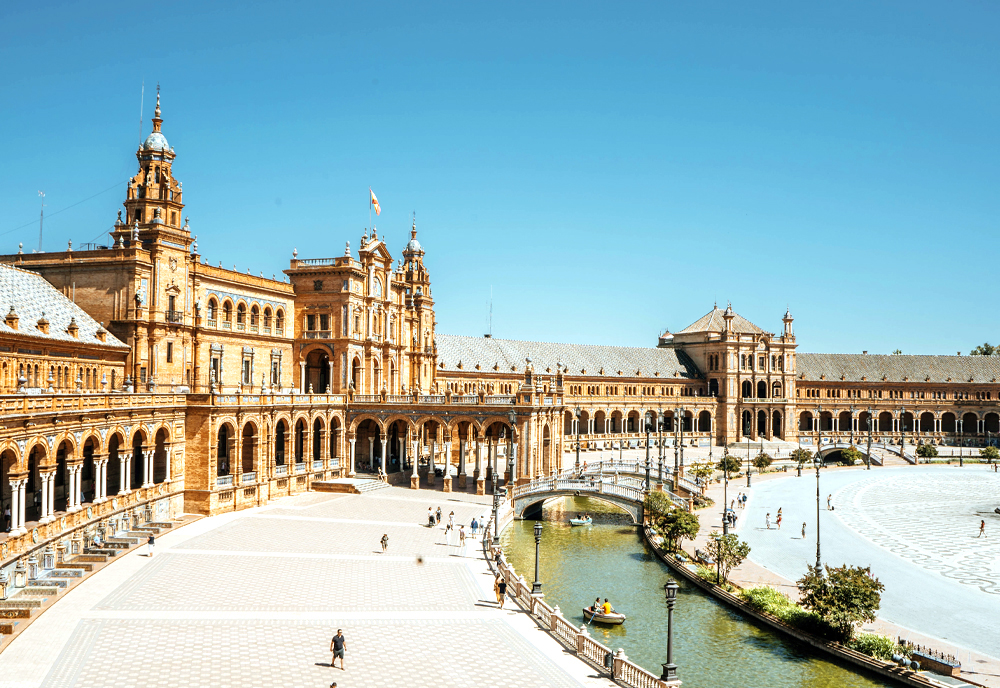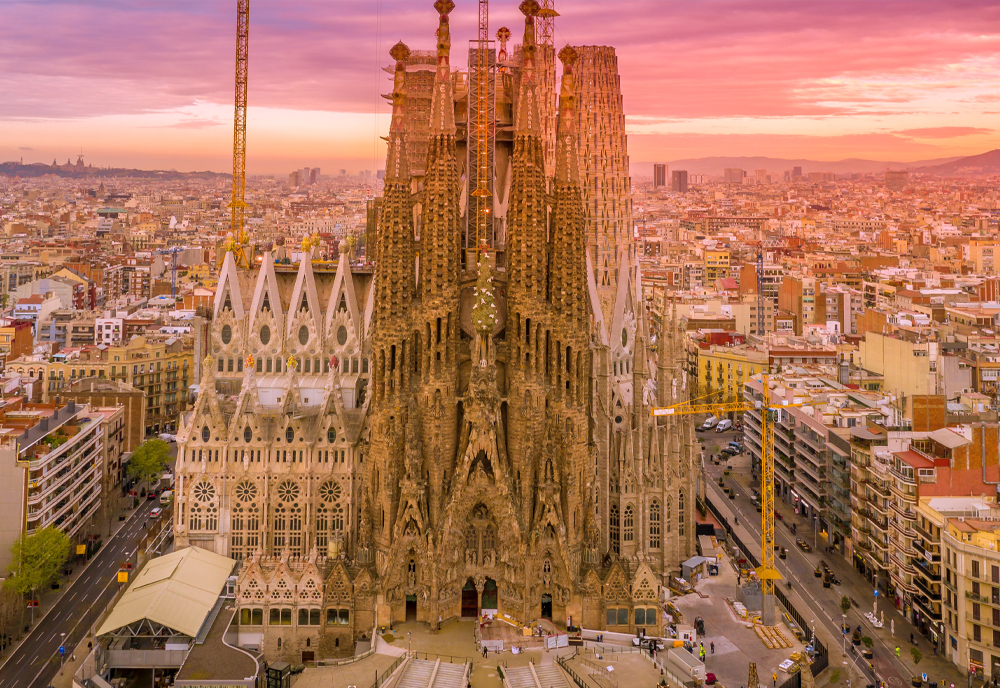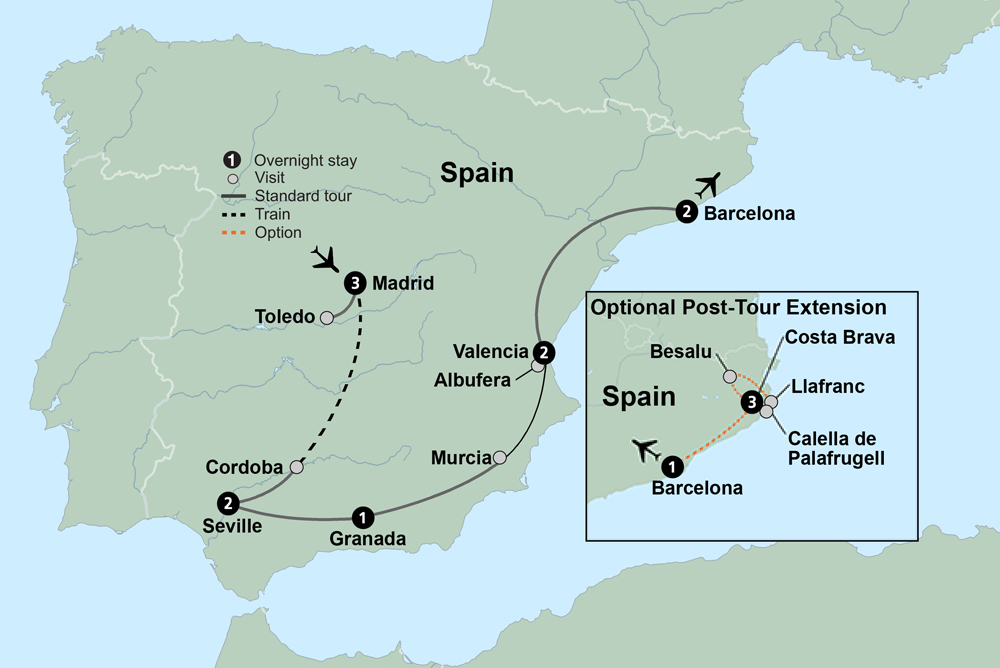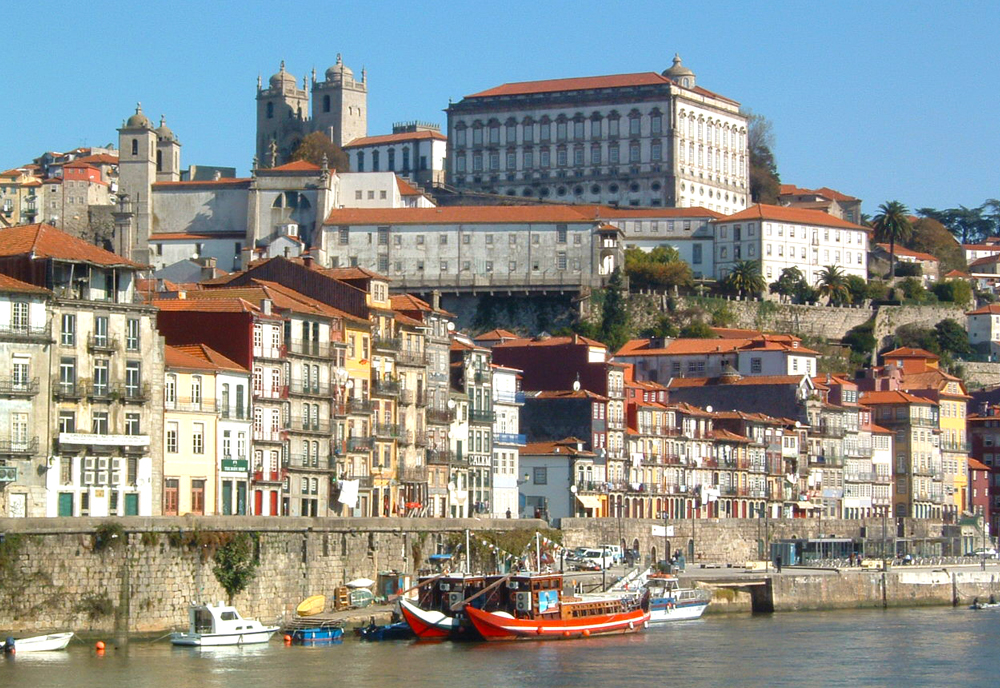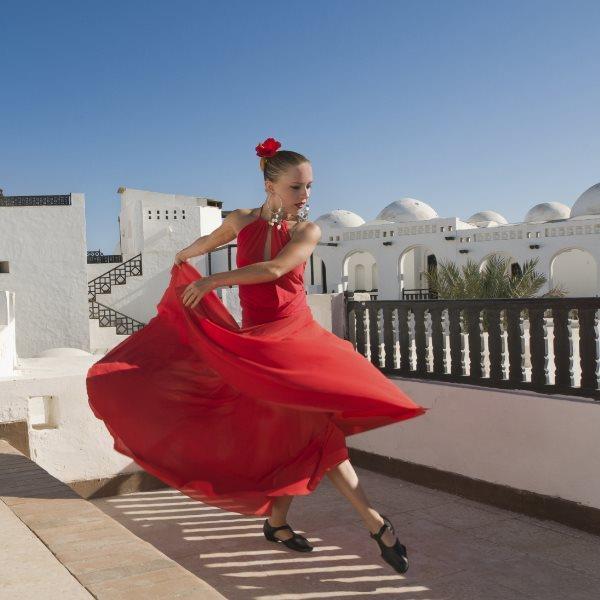Spain's Classics
Standard
Embark on a Spanish adventure as you take in medieval architecture, idyllic landscapes and delectable cuisine. Explore the wonders of the Prado Museum, one of Europe’s greatest museums. See the Cathedral of Seville, the third largest in the world. Enjoy reserved seating at a flamenco show and feel the passion of this famous dance. Visit the exotic and expansive Alhambra palace. Become part of an authentic "paella experience." View Antonio Gaudí’s architectural masterpieces, including a visit to La Sagrada Familia. Explore Spain's priceless treasures of art, history and culture set against a backdrop of sunny Mediterranean shores and grand mountain ranges.
| Additional Offers |
ID: 8147984
|
ID: 8148006
|
ID: 8147987
|
ID: 8148009
|
ID: 8147988
|
ID: 8148010
|
ID: 8147990
|
ID: 8148012
|
ID: 8147991
|
ID: 8148013
|
|---|---|---|---|---|---|---|---|---|---|---|
|
|
|
|
|
|
|
|
|
|
|
|
|
ID: 8147984
|
ID: 8148006
|
ID: 8147987
|
ID: 8148009
|
ID: 8147988
|
ID: 8148010
|
ID: 8147990
|
ID: 8148012
|
ID: 8147991
|
ID: 8148013
|
Madrid
Madrid is the capital and the largest city in Spain. Madrid sits on the Manzanares River, just northeast of the center of the Iberian Peninsula. It is estimated that the origins of Madrid can be traced back to the 2nd century B.C. Madrid is home to the head of the Spanish government, the Spanish royal family and the headquarters of the World Tourism Organization. Madrid’s influence on politics, education, entertainment, fashion and culture make it one of the world’s major global cities.
The Prado Museum
Stroll the halls and galleries inside the world-famous Prado Museum. On a guided tour, step back in time as you view its priceless collection of paintings and sculpture. Open since 1819, the Prado houses the works of legendary European artists from the 15th through early 19th centuries. Stand before the works of Velázquez and Goya, Spain’s greatest painters. Through their genius, gain insight into the rich culture surrounding you. Notable in the museum’s collection is Velázquez’s Las Meninas, one of the most important and studied paintings in the western tradition. Goya’s groundbreaking The Third of May 1808 also calls the Prado home. Whether you are an art aficionado or simply wish to explore the thrill of human expression, this is the perfect way to complete your visit to Madrid.
Toledo
Toledo is a municipality located in central Spain, about 43 miles south of Madrid and is the capital of the Toledo province. The history of Toledo dates back to the Roman occupation circa 192 B.C. The old city of Toledo is located on a mountain surrounded on three sides by the Tagus River, and medieval walls on the fourth side. From the top of the mountain it features a 150 degree view of the rest of the city.
Córdoba
Córdoba is located in Andalucía, southern Spain, and is the capital of the province of Córdoba. This city has an interesting history full of many diverse cultures and was the capital of a Roman province, the capital of an Arab State and a form of an Islamic government. It has the second largest old town in Europe, featuring Roman architecture, including a Roman bridge, as well as several Islamic and Jewish mosques.
La Mezquita
Seville
Seville is the capital and largest city of the autonomous community of Andalusia, Spain. Seville is the top destination in the Andalusia region for travelers. Approximately 2,200 years old, the early origins of the city date back to the year 712. It is situated on the Guadalquivir River which splits the city into two halves. Seville is famous for being the birthplace of the Flamenco dance. It is also known for its culture, monuments, traditions and artistic heritage.
Walking Tour of Santa Cruz Quarter or Boat Ride on the Guadalquivir River
While in Seville you have the choice between two activities. First, you can choose to walk along the cobblestone streets of the Santa Cruz Quarter with an expert guide, admiring the white washed houses and aromatic orange trees before continuing to the stunning Plaza de España in Maria Luisa Park. Or, if you prefer, you can get a glimpse of the city from a different perspective with a boat ride on the Guadalquivir River, gently drifting by timeworn bridges and gaining insight into the city’s historical connection to New World discoveries.Walking Tour of Santa Cruz QuarterActivity Level 2: Guests should be able to walk over uneven pavement and cobblestone and stand for 45-60 minutes without sitting.Boat Ride on the Guadalquivir RiverActivity Level 1: Guests should be able to get on and off the boat.
Flamenco Show
The heartbeat of Spain can be found in the houses of flamenco artists. A traditional flamenco show can be found in many of the small towns and cities scattered through the southern region of Spain, Andalusia. Flamenco is a style of dance encompassing the rhythm of lifestyle, personality and beauty of Spaniards. There is eminent beauty in every aspect of a Flamenco show from Andalusian décor, castanets, flamenco attire, polka dots, and the unforgettable strumming of the Spanish guitar. Flamenco is a type of Spanish folk music and dance originating in the region of Andalucía in southern Spain. It includes, singing, dancing, guitar playing and handclaps.
Granada
Granada is the capital of the province of Granada in the autonomous community of Andalusia, Spain and sits at the foot of the Sierra Nevada Mountains at the intersection of four rivers. This city is only an hour from the Mediterranean Coast. Granada has been continuously inhabited by people for the past 2500 years, starting under Ancient Roman rule and features rich cultural elements, historic architecture, beautiful beaches and the snowy Sierra Nevada Mountains.
The Alhambra
The Alhambra is a palace and fortress complex located in Granada, Andalusia, Spain. The first palace on the site was built in the 11th century and in the 12th and 13th century a fortress-complex palace was built. It is a vast complex, comprised of many structures. The Alhambra is part fortress, part palace, part garden and part government city. Many visitors come to Grenada specifically just to visit and see the Alhambra.
Valencia
Valencia is the capital of the autonomous community of Valencia, Spain. It is the third largest city in Spain after Madrid and Barcelona. The city is located on the banks of the Turia River on the east coast of the Iberian Peninsula. Valencia was founded as a Roman colony in 138 B.C. Its historic center is one of the largest in Spain at 169 hectares in size. The region of Spain, specifically Valencia, is known for its paella: a rice dish native to the country of Spain.
Paella Experience
Paella is a type of rice dish originating in the Valencian region on the east coast of Spain. The dish is widely regarded as Spain’s national dish, however most Spaniards consider it to be the regional dish of Valencia. Valencian paella is considered to be the original recipe, even though there are several different kinds of paella. The Valencian dish is comprised of white rice, green vegetables, meat, land snails, beans and seasoning.
Barcelona
Barcelona is an enchanting seaside city with boundless culture, fabled architecture and a world-class drinking and dining scene. Barcelona's architectural treasures span 2,000-plus years. Towering temple columns, ancient city walls and subterranean stone corridors provide a window into Roman-era Barcino. Fast forward a thousand years to the Middle Ages by taking a stroll through the shadowy lanes of the Gothic quarter, past tranquil plazas and soaring 14th-century cathedrals. In other parts of town bloom the sculptural masterpieces of Modernisme, a mix of ingenious and whimsical creations by Gaudí and his Catalan architectural contemporaries for which this city is so well known. Barcelona has also long-inspired artists, including the likes of Salvador Dalí, Pablo Picasso and Joan Miró, whose works are in bold display in the city's myriad museums.
La Sagrada Familia
La Sagrada Familia, the Holy Family, is a church of the people, built by the people, with the money of the people. While it is not the cathedral of Barcelona, it is widely known due to its unique architecture and phenomenal design initiated by architect Antoni Gaudí. Work on the exploratory church began in 1882 and continue to this day, but with modern technology and the rising number of visitors and donations, the church’s completion date has rapidly become closer. The facades of the church are breathtaking in their intricate and artistic details all of which were inspired by Gaudí. The church is divided into parts including the apse, chapels, cloister, crossing and transepts, crypt, glory façade, the nativity façade, the passion façade, the main nave and the sacristies.
Riu Plaza Espana
Calle Gran Via 84, Madrid, Spain
NH Sevilla Plaza de Armas
Marqués de Paradas, Seville, Spain
Barcelo Carmen
Acera del Darro, 62, Granada, Spain
AC Hotel by Marriott
Av De Francia 07, Valencia, Spain
Catalonia Plaza Catalunya
Carrer de Bergara, 11, Barcelona, Spain
Madrid
Madrid is the capital and the largest city in Spain. Madrid sits on the Manzanares River, just northeast of the center of the Iberian Peninsula. It is estimated that the origins of Madrid can be traced back to the 2nd century B.C. Madrid is home to the head of the Spanish government, the Spanish royal family and the headquarters of the World Tourism Organization. Madrid’s influence on politics, education, entertainment, fashion and culture make it one of the world’s major global cities.
The Prado Museum
Stroll the halls and galleries inside the world-famous Prado Museum. On a guided tour, step back in time as you view its priceless collection of paintings and sculpture. Open since 1819, the Prado houses the works of legendary European artists from the 15th through early 19th centuries. Stand before the works of Velázquez and Goya, Spain’s greatest painters. Through their genius, gain insight into the rich culture surrounding you. Notable in the museum’s collection is Velázquez’s Las Meninas, one of the most important and studied paintings in the western tradition. Goya’s groundbreaking The Third of May 1808 also calls the Prado home. Whether you are an art aficionado or simply wish to explore the thrill of human expression, this is the perfect way to complete your visit to Madrid.
Toledo
Toledo is a municipality located in central Spain, about 43 miles south of Madrid and is the capital of the Toledo province. The history of Toledo dates back to the Roman occupation circa 192 B.C. The old city of Toledo is located on a mountain surrounded on three sides by the Tagus River, and medieval walls on the fourth side. From the top of the mountain it features a 150 degree view of the rest of the city.
Córdoba
Córdoba is located in Andalucía, southern Spain, and is the capital of the province of Córdoba. This city has an interesting history full of many diverse cultures and was the capital of a Roman province, the capital of an Arab State and a form of an Islamic government. It has the second largest old town in Europe, featuring Roman architecture, including a Roman bridge, as well as several Islamic and Jewish mosques.
La Mezquita
Seville
Seville is the capital and largest city of the autonomous community of Andalusia, Spain. Seville is the top destination in the Andalusia region for travelers. Approximately 2,200 years old, the early origins of the city date back to the year 712. It is situated on the Guadalquivir River which splits the city into two halves. Seville is famous for being the birthplace of the Flamenco dance. It is also known for its culture, monuments, traditions and artistic heritage.
Walking Tour of Santa Cruz Quarter or Boat Ride on the Guadalquivir River
While in Seville you have the choice between two activities. First, you can choose to walk along the cobblestone streets of the Santa Cruz Quarter with an expert guide, admiring the white washed houses and aromatic orange trees before continuing to the stunning Plaza de España in Maria Luisa Park. Or, if you prefer, you can get a glimpse of the city from a different perspective with a boat ride on the Guadalquivir River, gently drifting by timeworn bridges and gaining insight into the city’s historical connection to New World discoveries.Walking Tour of Santa Cruz QuarterActivity Level 2: Guests should be able to walk over uneven pavement and cobblestone and stand for 45-60 minutes without sitting.Boat Ride on the Guadalquivir RiverActivity Level 1: Guests should be able to get on and off the boat.
Flamenco Show
The heartbeat of Spain can be found in the houses of flamenco artists. A traditional flamenco show can be found in many of the small towns and cities scattered through the southern region of Spain, Andalusia. Flamenco is a style of dance encompassing the rhythm of lifestyle, personality and beauty of Spaniards. There is eminent beauty in every aspect of a Flamenco show from Andalusian décor, castanets, flamenco attire, polka dots, and the unforgettable strumming of the Spanish guitar. Flamenco is a type of Spanish folk music and dance originating in the region of Andalucía in southern Spain. It includes, singing, dancing, guitar playing and handclaps.
Granada
Granada is the capital of the province of Granada in the autonomous community of Andalusia, Spain and sits at the foot of the Sierra Nevada Mountains at the intersection of four rivers. This city is only an hour from the Mediterranean Coast. Granada has been continuously inhabited by people for the past 2500 years, starting under Ancient Roman rule and features rich cultural elements, historic architecture, beautiful beaches and the snowy Sierra Nevada Mountains.
The Alhambra
The Alhambra is a palace and fortress complex located in Granada, Andalusia, Spain. The first palace on the site was built in the 11th century and in the 12th and 13th century a fortress-complex palace was built. It is a vast complex, comprised of many structures. The Alhambra is part fortress, part palace, part garden and part government city. Many visitors come to Grenada specifically just to visit and see the Alhambra.
Valencia
Valencia is the capital of the autonomous community of Valencia, Spain. It is the third largest city in Spain after Madrid and Barcelona. The city is located on the banks of the Turia River on the east coast of the Iberian Peninsula. Valencia was founded as a Roman colony in 138 B.C. Its historic center is one of the largest in Spain at 169 hectares in size. The region of Spain, specifically Valencia, is known for its paella: a rice dish native to the country of Spain.
Paella Experience
Paella is a type of rice dish originating in the Valencian region on the east coast of Spain. The dish is widely regarded as Spain’s national dish, however most Spaniards consider it to be the regional dish of Valencia. Valencian paella is considered to be the original recipe, even though there are several different kinds of paella. The Valencian dish is comprised of white rice, green vegetables, meat, land snails, beans and seasoning.
Barcelona
Barcelona is an enchanting seaside city with boundless culture, fabled architecture and a world-class drinking and dining scene. Barcelona's architectural treasures span 2,000-plus years. Towering temple columns, ancient city walls and subterranean stone corridors provide a window into Roman-era Barcino. Fast forward a thousand years to the Middle Ages by taking a stroll through the shadowy lanes of the Gothic quarter, past tranquil plazas and soaring 14th-century cathedrals. In other parts of town bloom the sculptural masterpieces of Modernisme, a mix of ingenious and whimsical creations by Gaudí and his Catalan architectural contemporaries for which this city is so well known. Barcelona has also long-inspired artists, including the likes of Salvador Dalí, Pablo Picasso and Joan Miró, whose works are in bold display in the city's myriad museums.
La Sagrada Familia
La Sagrada Familia, the Holy Family, is a church of the people, built by the people, with the money of the people. While it is not the cathedral of Barcelona, it is widely known due to its unique architecture and phenomenal design initiated by architect Antoni Gaudí. Work on the exploratory church began in 1882 and continue to this day, but with modern technology and the rising number of visitors and donations, the church’s completion date has rapidly become closer. The facades of the church are breathtaking in their intricate and artistic details all of which were inspired by Gaudí. The church is divided into parts including the apse, chapels, cloister, crossing and transepts, crypt, glory façade, the nativity façade, the passion façade, the main nave and the sacristies.
Riu Plaza Espana
Calle Gran Via 84, Madrid, Spain
NH Sevilla Plaza de Armas
Marqués de Paradas, Seville, Spain
Barcelo Carmen
Acera del Darro, 62, Granada, Spain
AC Hotel by Marriott
Av De Francia 07, Valencia, Spain
Catalonia Plaza Catalunya
Carrer de Bergara, 11, Barcelona, Spain
About Collette

With Collette, the World is Within Your Reach
True adventures go beyond incredible destinations or inclusive packages. Collette delivers a sense of possibility across all seven continents.
Since 1918, we have been sharing our love of travel. Today our worldwide travel collection features comprehensive land tours, river cruises, rail journeys, small group tours, family trips, garden holidays and more. With Collette, wake each morning on tour with a new experience in front of you, and when your head hits the pillow, you will know it has been an amazing day. Best of all - we seamlessly handle the details. All you have to do is enjoy the adventure.
About Collette

With Collette, the World is Within Your Reach
True adventures go beyond incredible destinations or inclusive packages. Collette delivers a sense of possibility across all seven continents.
Since 1918, we have been sharing our love of travel. Today our worldwide travel collection features comprehensive land tours, river cruises, rail journeys, small group tours, family trips, garden holidays and more. With Collette, wake each morning on tour with a new experience in front of you, and when your head hits the pillow, you will know it has been an amazing day. Best of all - we seamlessly handle the details. All you have to do is enjoy the adventure.

